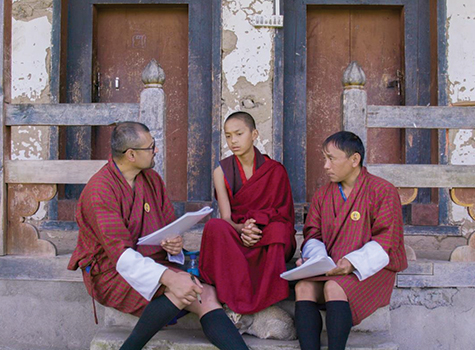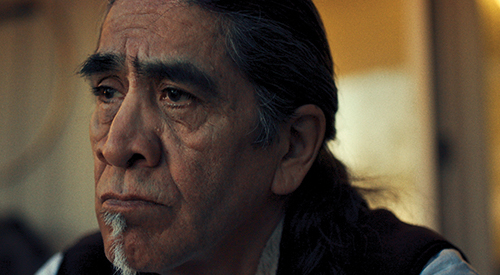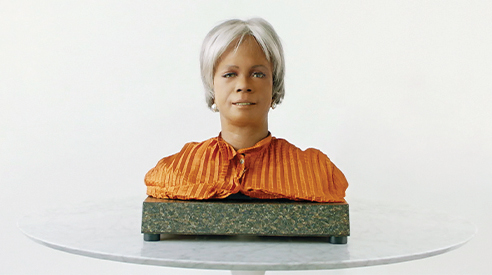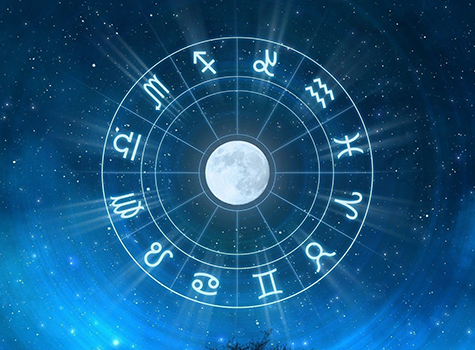By Dilip Barman

Full Frame is back! The 26th annual Full Frame Documentary Film Festival (fullframefest.org) was delightful, all the more so because it returned after five years, albeit with some virtual offerings. It seemed that this jewel might be gone but thankfully not.
Full Frame is one of the most important and biggest documentary film festivals, and we’re lucky to have it in Durham, NC. It’s an opportunity to see fabulous new films and curated, invited films, as well as enjoy panel discussions and meet filmmakers. The next one is in April 2025 – it’s not too early to start planning!
The Kingdom of Bhutan’s quiet alpine beauty is the backdrop for Agent of Happiness (2024, Arun Bhattarai & Dorottya Zurbóre). The country, the last to have television in 1998, claims to be one of the happiest places in the world and has a metric for this – their Gross National Happiness (GNH). They send surveyors around the country to measure and use the results as input to their 5-year development plans. This film follows two agents administering detailed surveys to folks in the countryside as well as in towns, resulting in a happiness score for each whom they interview.
One of the directors, Arun Bhattarai, shared that, “as a Bhutanese growing up in the times when GNH was created, I couldn’t escape it. We were taught GNH in schools, watched it on TV and even celebrated it on National Happiness Day – but I always felt conflicted about the ideals of GNH since I come from the ethnic Nepali community living in Bhutan. GNH promotes human well-being over material wealth, but the rights of the minority Nepali population were often not considered while talking about it.” As usual, (interesting) stories often have layers of complexity, and I enjoy how the filmmakers unravel the story at an unhurried pace.
The impact of experimental musician Brian Eno, both solo and with musicians like Roxy Music, David Byrne, David Bowie, Devo, U2, Coldplay, Peter Gabriel, and others, made for a suitably memorable film in Gary Hustwit’s 2024 film Eno. What made the film revolutionary was its use of generative technology such that the film can be remixed with scenes and sequences in different orders. Each screening can be a fresh new one.
Another excellent music documentary was Max Roach: The Drum Also Waltzes (Sam Pollard & Ben Shapiro, 2023); I have seen Pollard’s detailed biopic of Maynard Jackson Jr. Maynard (2018) several times and this film of his about legendary drummer Max Roach was different in mood and narrative flow, yet recognizable as one of Pollard’s. It was remarkable how much archival footage he had. He shared that he had the footage “in the can” for many years and waited until he felt just right about how to treat it before making the film.
On the heels of their 2020 film Boys State, directors Amanda McBaine & Jesse Moss made Girls State (2023), this time about a weeklong gathering of high school girls competing to be elected various positions for the week, from Governor to Supreme Court Justices and more. Besides the compelling story, I enjoyed the Q & A with one of the participants, now in college, and the filmmakers.

There were several hard-hitting films that I saw, including Sugarcane (Julian Brave NoiseCat & Emily Kassie, 2024), Power (Yance Ford, 2023), and Hollywoodgate (Ibrahim Nash’at, 2023). The first film was about the notorious Native American reeducation camps which housed children, trying to strip them of their culture, while in too many cases they suffered abuse at the hands of the priests and nuns who ran the schools. Power is a critique of modern policing, sharing historical perspectives and offering perspectives from the police themselves. Hollywoodgate tells the harrowing tale of Egyptian filmmaker Nash’at who gets permission by the Taliban to document a lieutenant and his men taking control of a CIA-abandoned base.
 Love Machina (Peter Sillen, 2024) was remarkable to me as it revealed technology that I was unaware of – that of filing/spacecasting “mind files” into outer space for preservation for 10,000-100,000 years or more and building of robots with the goal of preserving relationships. Inventor and entrepreneur Martine Rothblatt, creator of Sirius XM radio, left her job upon learning of her daughter’s medical condition to found a company that developed a drug that now saves not just the daughter but also thousands of others. The technology is quite remarkable and the story of preserving Martine and partner Bina’s love through AI robot Bina48 was well worth understanding.
Love Machina (Peter Sillen, 2024) was remarkable to me as it revealed technology that I was unaware of – that of filing/spacecasting “mind files” into outer space for preservation for 10,000-100,000 years or more and building of robots with the goal of preserving relationships. Inventor and entrepreneur Martine Rothblatt, creator of Sirius XM radio, left her job upon learning of her daughter’s medical condition to found a company that developed a drug that now saves not just the daughter but also thousands of others. The technology is quite remarkable and the story of preserving Martine and partner Bina’s love through AI robot Bina48 was well worth understanding.
Story & Pictures By (Joanna Rudnick, 2023) was an excellent film for anybody who has a soft spot for children’s literature. The film was bright and peppy on one level, mirroring the kinds of books it portrayed, but also delved into the real world lives and challenges of the authors.
It’s frustrating to see how divided our modern politics is and I often wonder why we can’t see more commonalities among us. The film Red Whiteville and Blue (2024, D. L. Anderson) describes the Great Economy Project and the nonprofit Patriotic Millionaires who provide money to organize and educate communities about how politicians should work to provide more equitable economic opportunities which, they claim, is the real issue hidden behind smokescreens of “liberal” and “conservative” labels. This film describes Whiteville, a community of about 5000 in southeastern, North Carolina. The empowerment of the citizens is tangible in seeing their working together across many “dividing” lines. The audience cheered their strength of conviction when they boarded a bus to Raleigh and spoke at the State Legislature.

Filmmakers Nancy Buirski, founder and, for ten years, director of Full Frame, and D. A. Pennebaker, pioneer of cinematic realism captured through “fly on the wall” lightweight cameras, were honored at the festival. I previously reported on Buirski’s The Loving Story (2011) about the landmark Supreme Court case that overturned restrictions on interracial marriage; it was shown, along with several others by her. I enjoyed Pennebaker’s first film, Daybreak Express (1957) which showed five minutes by train of New York City with a score by Duke Ellington, as well as his 1967 Dont Look Back about Bob Dylan’s tour of England in 1965. Many will be familiar with the classic cards Dylan tosses in a New York alleyway to the music of “Subterranean Homesick Blues”; this is the opening scene from Dont Look Back (yes, there is no apostrophe). Another of Penny’s films, Town Bloody Hall (1979) witnesses a surprisingly raucous panel discussion of women’s liberation with author Germaine Greer, National Organization for Women president Jacqueline Cerballos, Village Voice journalist Jill Johnston, and literary critic Diana Trilling, moderated by author Norman Mailer.
The festival ended with a Dawn Porter film about Luther Vandross, Luther: Never Too Much (2024). I love the music that directly influenced his music, Philly Soul, and that set the stage for contextualizing his music and entertainment trajectory. His life story is one that is touching in his kindness and painful in seeing his ongoing battles with diabetes and weight.
I could only report on some of the many films that I saw. Often difficult choices among parallel screenings had to be made! Unfortunately, many of these films only tour the festival circuit.
Did I mention “Full Frame is back!”? It’s a fabulous opportunity to take four days off and immerse oneself in fascinating storytelling learning about topics both familiar and unfamiliar. April 2025?
Dilip Barman is a lover of culture and teacher of math and vegan food/nutrition. Check out his monthly show somanycooks.com. Contact: [email protected].



